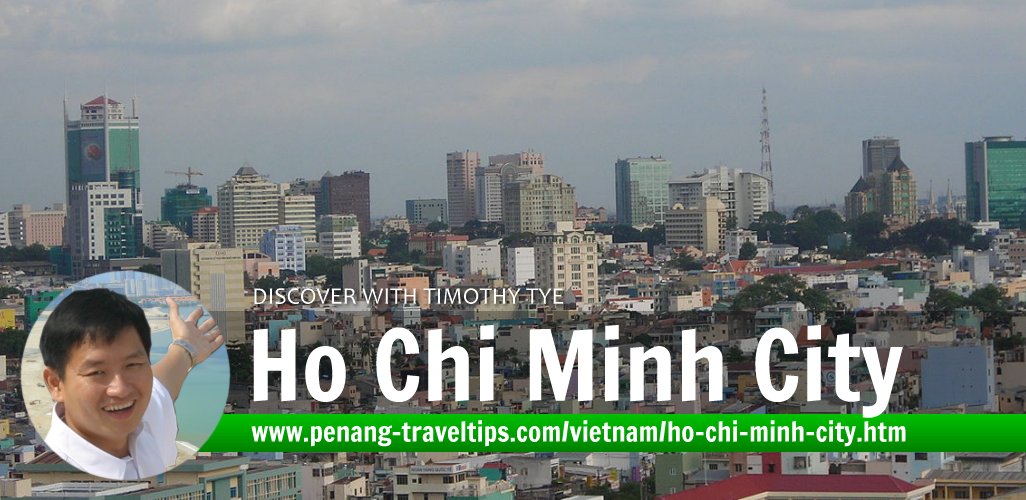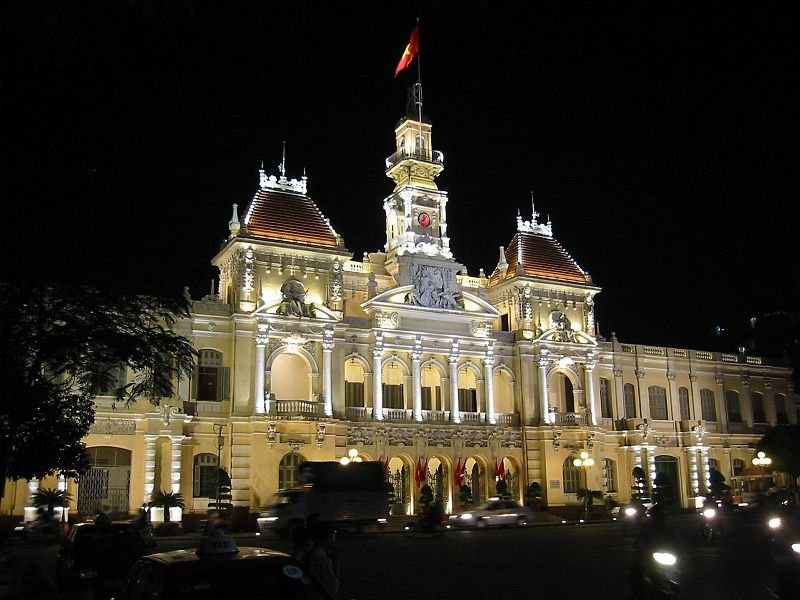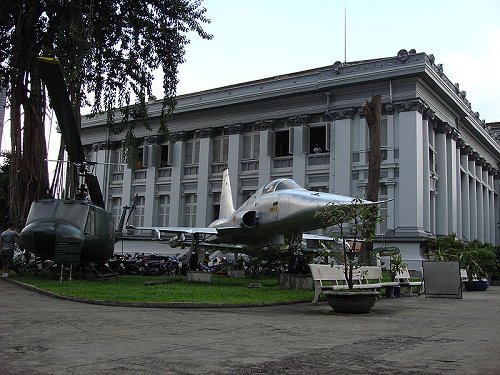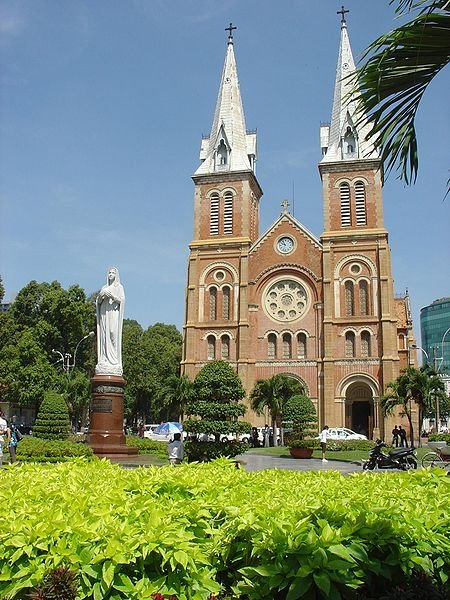 Ho Chi Minh City, Vietnam
Ho Chi Minh City, VietnamSource: https://commons.wikimedia.org/wiki/File:Saigonskyline1.JPG
Author: Genghiskhanviet

Author: Genghiskhanviet

Ho Chi Minh City (Vietnamese: Thành phố Hồ Chí Minh
 ) is the biggest city in Vietnam. Formerly known as Saigon, it was renamed Ho Chi Minh City in honor of the Vietnamese leader. The city has a metropolitan area with a popultion of over 9 million people. It was the capital of the state of South Vietnam between 1954 to 1975, and before that, it was the capital of the French colony of Cochinchina.
) is the biggest city in Vietnam. Formerly known as Saigon, it was renamed Ho Chi Minh City in honor of the Vietnamese leader. The city has a metropolitan area with a popultion of over 9 million people. It was the capital of the state of South Vietnam between 1954 to 1975, and before that, it was the capital of the French colony of Cochinchina.Ho Chi Minh City began as a fishing village called Prey Nokor, inhabited mostly by the Khmr people since the time of antiquity until the early 17th century, when ethnic Vietnamese migrated and settled there, elbowing out the Khmers. Under the Khmers, it was an important trading port. Under the Vietnamese, Prey Nokor became known as Sài Gòn.
The modern Ho Chi Minh City is located on the banks of the Saigon River. It is 60 km from the coast of the South China Sea, and 1760 km (1094 mi) from Hanoi.
What to eat at Ho Chi Minh City
- Hainanese Chicken Rice at Twelve - Cơm Gà Hải Nam Singapore recommended by Ben Teo Hwee Beng on 29 August, 2019
 Hôtel de Ville - the former town hall of Ho Chi Minh City
Hôtel de Ville - the former town hall of Ho Chi Minh CitySource: https://commons.wikimedia.org/wiki/File:City_Hall_Ho_Chi_Minh_City_Vietnam.jpg
Author: Thomas Schoch

Author: Thomas Schoch

Climate of Ho Chi Minh City
The city experiences a tropical climate with an average humidity of 75%. Average daily temperature ranges from 23.7 °C to 32.3 °C, and is fairly uniform throughout the year, with late December being the coldest month. The wettest months are JUne and September, with over 300 mm of rainfall. The driest months are from January to March.Visiting Ho Chi Minh City
The international gateway to Ho Chi Minh City is Tan Son Nhat International Airport, the biggest airport in Vietnam. It has two terminals. The new terminal handles the international flights while the old one manages the domestic traffic.Bus No. 152 is an air-conditioned airport bus that go between the airport and downtown Ho Chi Minh City. It only costs 3,000 dong one way. The bus station is located at the domestic terminal.
You can of course also take the taxi downtown. This will set you back 90,000 dongs, for a journey that is just 15 minutes if the traffic is smooth, or over an hour, if you are caught in a jam. The crawling-in-jam ride will be more costly by an additional 30,000 to 60,000 dongs.
 Ho Chi Minh City Museum
Ho Chi Minh City MuseumSource: https://commons.wikimedia.org/wiki/File:Ho_Chi_Minh_City_Museum.jpg
Author: Jorge Láscar

Author: Jorge Láscar

Getting around in Ho Chi Minh City
You have the option of regular taxis or motorcycle taxis. If you opt for the latter, by all means agree on a price before you climb on board. However, do not expect the motorcycle taxis to be any cheaper than the regular taxis.The major taxi companies in Ho Chi Minh City are Vinasun and Mai Linh. You should avoid any other companies as they are quite unscrupulous - meaning some of them have meter that can be made to go faster than actual, something prevalent throughout Vietnam and is painting a rather unfortunate picture for its tourism reputation.
 Notre Dame Cathedral in Ho Chi Minh City
Notre Dame Cathedral in Ho Chi Minh CitySource: https://commons.wikimedia.org/wiki/File:HCMC_Notre_Dame_Cathedral.jpg
Author: Eustaquio Santimano

Author: Eustaquio Santimano

Places of Interest in Ho Chi Minh City
- Ben Thanh Market
Early 20th century shopping center in the city. - Binh Chau Hot Springs
An area with over a hundred natural hot springs. - Binh Tay Market
The name means "big market", and that's an apt description. - Cao Dai Holy See
Center of the Cao Dai religion. - Caravelle Hotel
One of the biggest hotels in Ho Chi Minh City - Cat Tien National Park
One of the most biologically rich sites in Vietnam. - Continental Hotel
One of the grandest hotels in Ho Chi Minh City, erected in 1886. - Cholon District
The Chinatown of Ho Chi Minh City. - Cu Chi Tunnels
Two set of tunnels, one at Ben Dinh village used by the Vietcongs, and the other at Ben Duoc village, created for tourist purposes. - Dan Sinh Market
Bazaar selling all sorts of war surplus products and memorabilia. - Dong Khoi
Main commercial street in Ho Chi Minh City. - Fine Arts Museum
Museum housing Vietnamese works of art, from paintings to ceramics, sculptures and lacquerware. - General Post Office
One of the most attractive buildings in Ho Chi Minh City, designed by none other than Gustave Eiffel of Eiffel Tower fame. - Giac Vien Pagoda
Temple on the outskirts of Ho Chi Minh City established in 1744. - Ho Chi Minh City Museum
French-style building that was formerly the French governor general's residence, today showcasing the 300-year history of the city. - Ho Coc Beach
An undeveloped, rather secluded beach. - Jade Emperor Pagoda
One of the most ornate temples in Ho Chi Minh City, the Jade Emperor Pagoda is dedicated to the King of All Heavens. - Le Van Duyet Temple
Temple devoted to General Le Van Duyet (1763-1831), a national hero rather than to a deity. - Long Hai
A stretch of relatively unspoilt beach. - Mariamman Hindu Temple
Temple dedicated to Mariamman, the manifestation of Shakti, the Hindu goddess of strength. - Municipal Theater
Elegant French-colonial style concert hall erected in 1899. - Museum of Vietnamese History
Pagoda-style building with vast collection of Vietnamese artifacts. - Nghia An Hoi Quan Pagoda
One of the oldest pagodas in Ho Chi Minh City. - Nui Ba Den
Black Lady Mountain, a forest-clad mountain set amid shimmering lakes. - Notre Dame Cathedral
The largest Roman Catholic church ever erected in the French empire. - One Pillar Pagoda of Thu Duc
A small pagoda based on the Lien Phai Pagoda of Hanoi, built by a monk after the country split into two in 1954. - People's Committee Building
Formerly the Hôtel de Ville or town hall, this is an iconic building in Ho Chi Minh City. - Phung Son Pagoda
Pagoda built between 1802 and 1820 on the site of an ancient building. - Quan Am Pagoda
Temple dedicated to the goddess of mercy. - Reunification Palace
The former Presidential Palace, located on the site of the Norodom Palace in the 19th century. - Rex Hotel
Hotel that was the center of social and military activities of the American soldiers during the Vietnam war. - Thien Hau Pagoda
Commonly called Chua Ba, or Lady's Pagoda, this temple is dedicated to Thien Hau, the deity of the sea and patronness of sailors. - Vinh Nghiem Pagoda
The largest pagoda in Ho Chi Minh City, built with funds from the Japan-Vietnam Friendship Association. - Vung Tau
Popular seaside getaway that is quite crowded and noisy during he weekends. - War Remnants Museum
Museum, housed in the former US Information Service building, documents the atrocities of the Americans, Chinese and French soldiers in grim detail. - Women's Museum of Southern Vietnam
Museum celebrating the cultural and military contribution of the women in Southern Vietnam. - Xa Loi Pagoda
One of the most important pagodas during the communist revolution, this was where three monks immolated themselves as a gesture of protest.
 Latest updates on Penang Travel Tips
Latest updates on Penang Travel Tips
 Map of Roads in Penang
Map of Roads in Penang
Looking for information on Penang? Use this Map of Roads in Penang to zoom in on information about Penang, brought to you road by road.
Copyright © 2003-2025 Timothy Tye. All Rights Reserved.

 Go Back
Go Back